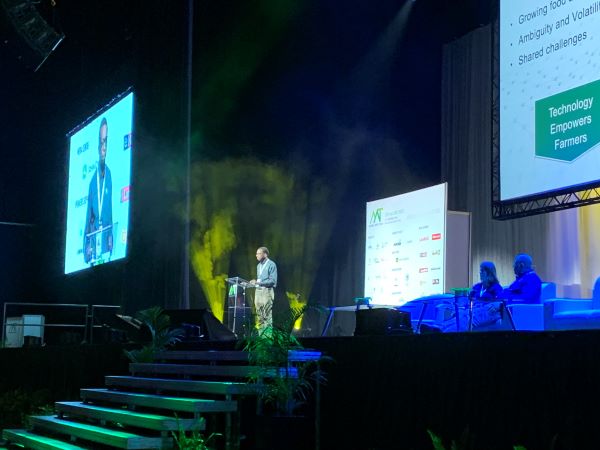Tavonga Siyavora ,program manager for new market entry at John Deere ,addressing attendees at the #AAT2020
As pressure mounts globally to produce more food with fewer resources, agriculture is gaining strategic importance. At the same time challenges are mounting. From climate change, political and economic uncertainty, ongoing cost and price pressures, lack of access to capital or inadequate financial support, adverse legislation, to artificial tariffs and trade exclusions, or poor infrastructure bedevil the industry globally and especially in Africa. In this challenged and confusing landscape, technology presents a unique opportunity for farmers and the entire agricultural value chain to run more sustainable businesses – reducing costs and increasing yields by enabling smarter, more precise, and faster, decisions. Ever-greater volumes of data available to ever-more players across the agricultural value chain is generating untold new opportunity for agriculture in the Fourth Industrial Revolution.
S.M.A.R.T. Campaign for smallholder farmers
John Deere is committed to driving Africa’s green revolution by bringing more land into sustainable, scientifically managed and mechanised production. This is increasing yields, expanding agricultural ecosystems and growing export volumes and agricultural earnings across the continent. John Deere equipment and solutions are designed for all farmers, irrespective of size of holding or scale of production. Our S.M.A.R.T. campaign, for example, focusses on providing emerging farmers – who can’t afford their own tractors – access to mechanisation. This directly supports our goal of bringing more of Africa’s land into commercial food production while increasing yields through the application of appropriate technology.
To this end, training and education play a critical role in our S.M.A.R.T. strategy – along with collaboration and the sharing of insights amongst farmers, communities, industries, and governments. For bigger operations using larger and more sophisticated equipment, John Deere has an open platform called More Tools where farmers share – and acquire – data from a personally selected segment of providers and off-takers. The data universe that each farmer assembles on More Tools enables much faster, better-informed and much more accurate decision making. More Tools is dramatically increasing the efficiency, reducing the waste and damage, increasing the yield and significantly improving the incomes of farmers across the world.
John Deere manages a professional and independent dealer network to market, sell and support John Deere equipment in the field. As a global technology company, John Deere is intensely focussed on providing competitive agricultural solutions to its full range of customers farming in almost every ecosystem and market on the planet.
AAT 2020
We believe that the 2020 AAT Exhibition and Conference is the first of its kind, the “Agritechnica” of the African continent. ATT is an opportunity to demonstrate that Africa has a key role to play in global food production.
ATT is also an opportunity to show how advanced agricultural technology and innovation has become, along with what this technology might look like in future. The exhibition and conference is also a great opportunity to learn from one another and build relationships that will unlock Africa’s vast agricultural potential, repositioning the continent as tomorrow’s global agricultural giant. John Deere is excited to participate in a platform of this stature, sharing our world-leading insights in support of Africa’s green revolution.
John Deere was particularly encouraged by the presence of so many companies not traditionally associated with agriculture. This demonstrates the importance of agriculture to ever-wider value chains as well as well as the role that agricultural technology and data are playing in broader economic development and social stability.
Future of agriculture production in Africa
Africa has the potential to be self-sufficient in food production – of both raw and beneficiated or processed foods. Africa could also be a leading global food and agri-business supplier. Building a world-leading agro-industrial sector in Africa will, however, require significant focus and coordination – across policy, legislation, integration, investment, infrastructure, technology and education. While these are all challenges for Africa, since 60% of Africans currently derive their livelihoods from agriculture, the sector provides the most effective mechanism to create the jobs, income and growth to ensure Africa’s development, social stability and long-term prosperity.








